Heat Pump vs. Gas Furnace in Los Angeles- the wise deal?
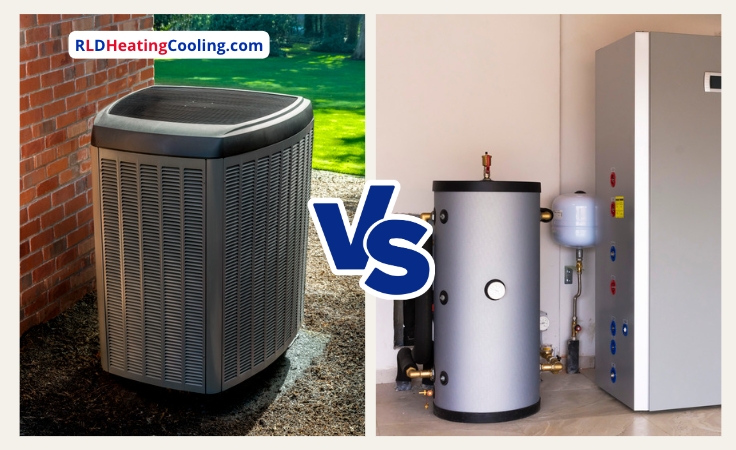
When it comes to heating your house, it’s essential to understand the details about all the appliances before making an investment.
Both Heat pumps vs. Gas furnaces are great systems, but choosing between them is a difficult task.
Many factors need to be considered:
- Cost
- Maintenance
- Lifespan
- Efficiency
- Heating capacity
- Noise level and more.
Also, there are differences and similarities between the two systems.
Heat pumps run on electricity, and gas furnace runs on natural gas.
Both systems also differ in the technologies they use.
When it comes to cost, it depends on both the fuel price and the device efficiency.
Sounds super confusing? Well, worry not!
This blog will help you determine whether a heat pump or a gas furnace is the best fit for your needs.
So keep reading!
How does a Heat Pump work?
A heat pump is a device that heats and cools your house.

It transfers heat from outside to inside, making your home warm and cozy.
During warmer months, the appliance reverses the process and transfers the hot air from inside your house to outside.
It is a two-in-one system, offering an excellent replacement for both an air conditioner and a heating system.
Heat pumps operate on electricity and don’t produce pollution, making them considered eco-friendly.
However, since the system operates based on outside heat, its efficiency decreases as the outdoor temperature drops.
Advantages & Disadvantages of Heat Pump
Some advantages and disadvantages of heat pumps are:
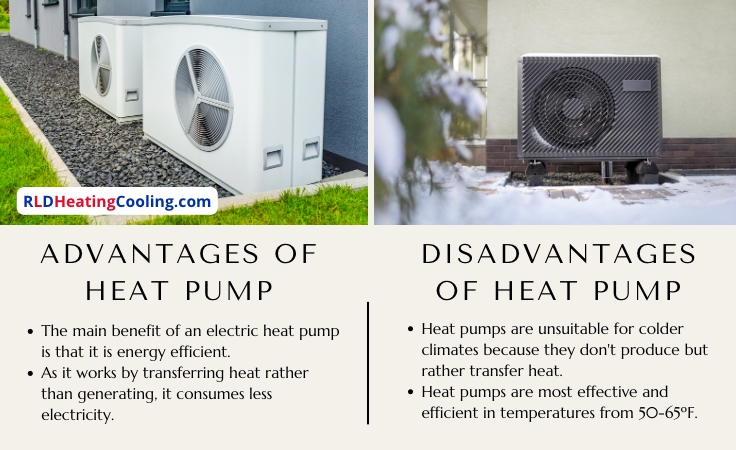
Advantages
The primary benefit of an electric heat pump is its energy efficiency.
As it works by transferring heat rather than generating, it consumes less electricity.
You get better heating at lower energy costs and a reduced carbon footprint.
Also, don’t forget the versatility, as you get two modes in a single system.
Disadvantages
Heat pumps are unsuitable for colder climates because they don’t produce but rather transfer heat.
Heat pumps are most effective and efficient in temperatures from 50-65ºF.
The system remains effective at 40 degrees, but as the temperature drops below that, you will likely notice a decrease in its heating ability.
The only solution left is to add auxiliary heating strips, which provide the additional heat needed to keep you warm.
These are usually standard in most heat pumps.
They keep you warm, but are less energy-efficient than heat pumps.
What is a Gas Furnace?
A gas furnace is a system that utilizes natural gas or propane to heat your home.
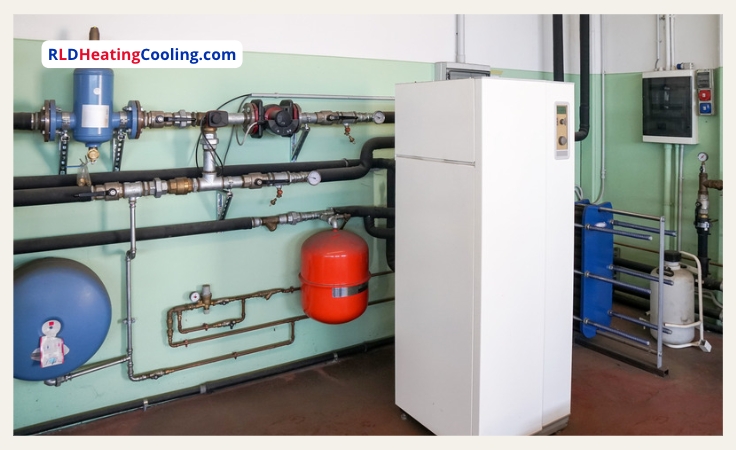
It generates heat with the process of fuel conversion. (1)
The heat generated by the system is distributed throughout your house to raise the temperature during winter.
As a gas furnace burns a lot of fuel, it also emits harmful gases, which are released into the atmosphere.
A gas furnace is not a wise option if you’re looking to decrease your carbon footprint.
However, unlike heat pumps, gas furnaces cannot cool your house.
Advantages & Disadvantages of a Gas Furnace
Let’s have a look at the advantages and disadvantages of Gas Furnace:
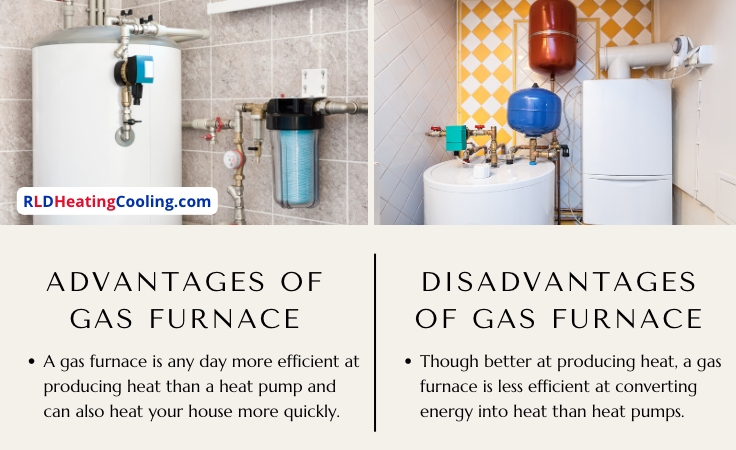
Advantages
A gas furnace is any day more efficient at producing heat than a heat pump and can also heat your house more quickly.
Regardless of the temperature outside or inside, a gas furnace will produce sufficient heat to keep your house comfortable.
All you need is a steady gas or electricity supply. Also, unlike heat pumps, gas furnaces are just as efficient at 50ºF as at -30ºF.
Disadvantages
Though better at producing heat, a gas furnace is less efficient at converting energy into heat than a heat pump.
So the energy costs are higher if you live in colder regions.
Secondly, gas furnaces can only be used where natural gas or propane is available.
Lastly, gas furnaces need proper ventilation since they emit combustible materials. So, you also have to plan its placement wisely.
Gas furnaces also require proper venting, as they burn combustible materials, and this venting may be a challenge depending on where the furnace can be located within your home.
So you need the help of a gas furnace service company.
Difference between the Gas Furnace and Heat Pump
Now let’s take a look at the difference between a gas furnace vs. a heat pump to help you decide if replacing a gas furnace with a heat pump is a wise choice:
Heat Pump vs. Gas Furnace difference #1: Mechanism
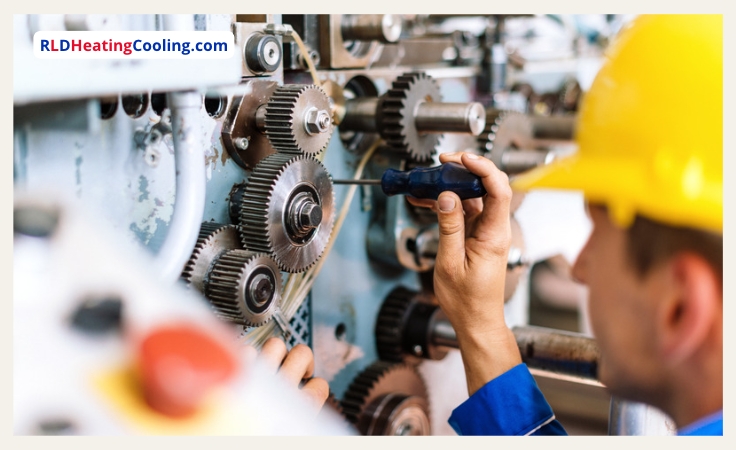
A heat pump transfers heat from the external environment to inside your house by absorbing the outside heat and pushing it inside.
The gas furnace, on the other hand, generates heat.
Heat Pump vs. Gas Furnace difference #2: Initial cost
The unit price of a heat pump is higher than that of a gas furnace.

If your house has easy access to gas, a gas furnace installation is an advantageous option.
However, if your house already has ductwork, installing a heat pump is a more cost-effective option.
Heat Pump vs. Gas Furnace difference #3: Outdoor weather
Since a gas furnace produces heat to raise the temperature of your house, it can efficiently operate in every climate or temperature.

However, a heat pump cannot do so, as it transfers heat rather than generates it.
So, its efficiency dips when the temperature goes below 30 degrees.
Heat Pump vs. Gas Furnace difference #4: Maintenance
Both heat pumps and gas furnaces need regular preventive maintenance and filter changes.

However, some heat pump models require frequent changes to the refrigerant line and fittings.
After working for ten or more years, you may notice frequent repairs to your heat pump and gas furnace.
Furnaces are low-maintenance throughout their lives.
Heat Pump vs. Gas Furnace difference #5: Lifespan
The average life of a gas furnace is about 30 years. With proper maintenance, you can extend its life up to 35 years.
Heat pumps last for about 20-25 years. The primary difference is that heat pumps operate throughout the year, whereas gas furnaces operate primarily during cold seasons.
Also check out: Single-stage vs two-stage furnace.
Heat Pump vs. Gas Furnace difference #6: Eco-friendliness

Gas furnaces are not environmentally friendly, as they emit carbon monoxide and other harmful gases into the air during operation.
Heat pumps run on electricity, don’t emit any gases, and are therefore considered environmentally friendly.
Heat Pump vs. Gas Furnace difference #7: Noise level
In normal circumstances, a heat pump is noisier than a gas furnace.

They create a whirring sound when the compressor turns on or off.
While the gas furnace makes a whooshing sound.
However, if there are mechanical issues, both systems can make weird noises.
Heat Pump vs. Gas Furnace difference #8: Space required
Gas furnaces are installed inside the house and typically require approximately 30 inches of clear space on all sides.
Heat pumps occupy less space and require only 24 inches of clear space on all sides.
Though they are installed outside, they need an air handler inside.
Also check out: HVAC vs furnace.
Heat Pump vs. Gas Furnace difference #9: Heating and cooling
A gas furnace can only heat your house.
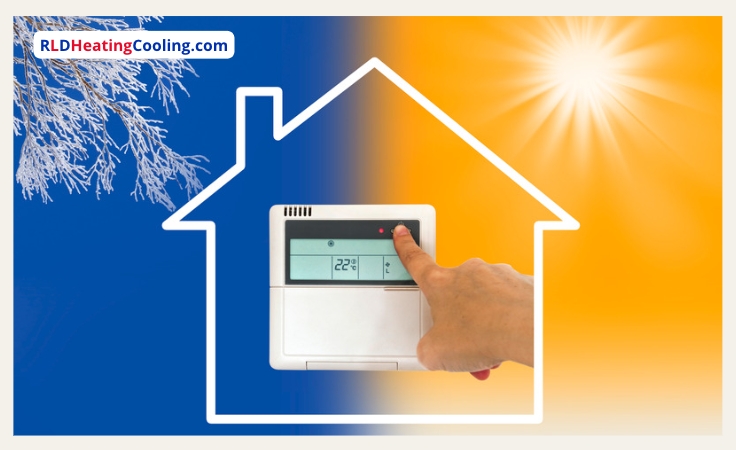
On the contrary, a heat pump can heat and cool your house. So you can use them in both seasons.
Heat Pump vs. Gas Furnace difference #10: Running cost
It is challenging to determine which heating solution is more cost-effective to run.
The cost depends on energy efficiency, i.e., how efficiently the fuel is utilized.
The cost also relies on the price of the fuel used.
Heat Pump vs. Gas Furnace difference #11: Heating capacity
A gas furnace can generate 4,000-120,000 BTUs, covering between 500 sq. ft. and 3,000 sq. ft.
But they often provide uneven heating in different areas.
On the contrary, a heat pump can generate 9,000-60,000 BTUs, heating areas ranging from 200 sq. ft. to 1,400 sq. ft. evenly.
Heat Pump vs. Gas Furnace calculator
The cost of running a heating system on a property is essential.
You need to determine the cost efficiency of a gas furnace vs. a heat pump to determine the right fit for your house.
You must do the calculation after looking at several factors:
Energy cost
As we know, gas furnaces operate on propane or natural gas, and heat pumps use electricity.
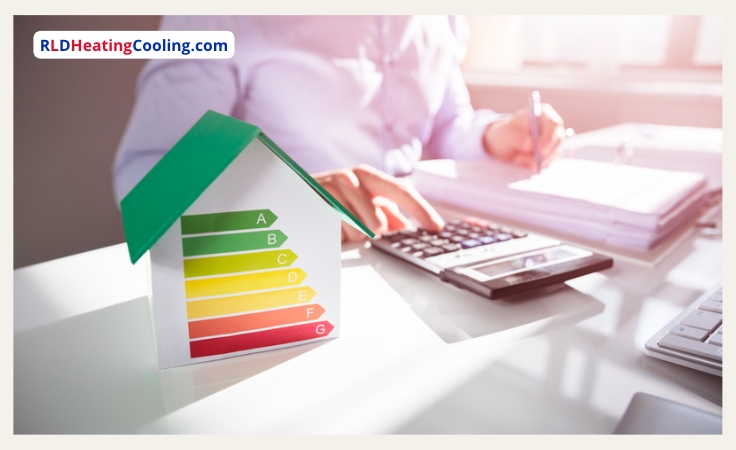
It’s not just the energy cost that differs, but fuel prices also vary for other states.
Depending on where you live, the cost of fuel used by your heating system may vary.
The price of electricity in Los Angeles is $0.26 per kilowatt-hour (kWh), while that of natural gas is $2.059 per therm.
Device efficiency
Every system you use comes with an efficiency rating. It indicates how efficiently the device can utilize energy.
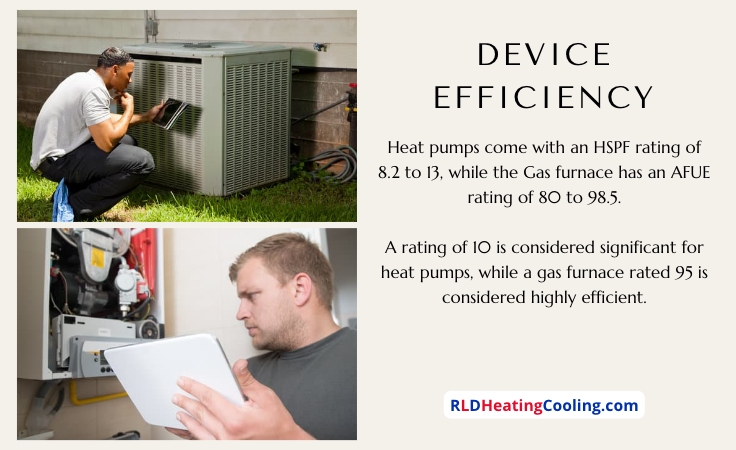
Heat pumps typically have an HSPF rating of 8.2 to 13, while gas furnaces have an AFUE rating of 80 to 98.5.
A rating of 10 is considered significant for heat pumps, while a gas furnace rated 95 is considered highly efficient.
But what do these ratings mean?
If a heat pump has a 10 HSPF rating, it means it can generate 10,000 BTUs of heat every hour.
Assuming we need 60,000 BTUs, a 10 HSPF heat pump should be sufficient.
On the other hand, a gas furnace with an AFUE rating of 95% means it can utilize 95% of the energy of 1 therm, i.e., 95% of 100,000 or 95,000 BTUs.
Other factors
The above two factors are the critical factors that affect the efficiency, output and cost of operating a heat pump or a furnace.
However, other things come into play.
Elements, such as property size and outdoor temperature, play a significant role.
Therefore, you must calculate the cost, taking all these factors into account.
Heat Pump vs. Gas Furnace- Which one to choose
The most crucial factor for any property owner when choosing the ideal heating system is the long-term operating cost.

But by now, you must be aware that deducing this requires careful computations and several considerations.
Besides the estimations, there are other factors to consider. Before investing, you must ask yourself several questions about your needs.
- If the place you live in experiences cold climates with an average temperature of 30-40 degrees, a heat pump is an excellent choice for your property.
- A furnace will be a more effective heating source if you live in a region with intensely cold winters.
- For small to medium-sized buildings, a heat pump is an appropriate choice. A mini split heat pump will help you with zonal control, while other variants come with uniform heating.
- A furnace would be an excellent option for large properties with an area above 1,400 sq. ft. Furnaces are engineered to heat properties as large as 3,000 sq. ft.
Heating system and HVAC services at RLD Heating and Cooling
If you still need clarification about the right heating system for your home, we at RLD Heating and Cooling Services are here to help, as we provide a wide range of cooling and heating services.
We take pride in being one of the top HVAC companies in Los Angeles, with expertise in all aspects of HVAC-related services.
Contact us to book an appointment.
FAQs
Here are some of the questions people usually ask:
Which is better, a heat pump or a gas furnace?
Generally, heat pumps are considered the most suitable for areas with mild winters, such as the southern or coastal states.
However, suppose you live in a place that experiences extreme cold. In that case, gas furnaces are better as they offer more efficient heat, making them suitable for harsher and colder weather conditions, such as those found in northern locations.
Are heat pumps more cost-effective to operate than gas?
If you install a heat pump in a thermally efficient property, it will be cheaper than a gas boiler.
Other than that, heat pumps are usually more expensive than gas furnaces as they consume electricity.
What is the downside to a heat pump?
Air source heat pumps sometimes experience issues like icing during cold temperatures, which can damage the system.
Modern heat pumps often come with an in-built defrosting system, but their energy efficiency can decrease during cold temperatures.
During harsh winters, heat pumps consume a significant amount of electricity.
Should I replace my furnace with a heat pump?
As mentioned earlier, a heat pump is suitable for moderate climates.
Therefore, switching to a heat pump is a wise option if you live in such a location.
Although heat pumps use electricity, they consume less energy than furnaces in heating mode.
Also, heat pumps can provide both heating and cooling.
Sources:
- https://www.familyhandyman.com/article/how-does-a-gas-furnace-work/
